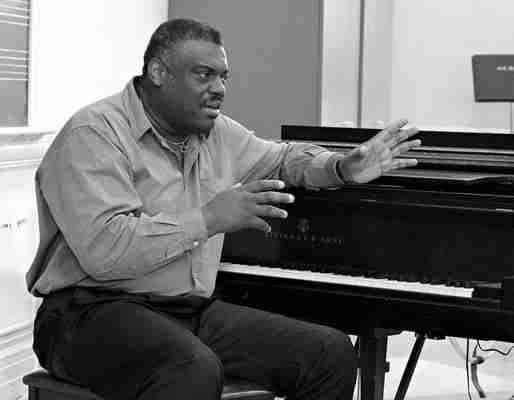Perspective is a powerful tool. At times it’s an unexpected wake-up call, uncovering hidden possibilities and pushing us to get to the next level. At others, it makes us step back and take a look at the big picture, forcing us out of our daily routine and narrow world-view with a healthy dose of reality.
The problem is that maintaining a balanced perspective day in and out is not that simple. It’s easy to get stuck in a mindset of focusing on your shortcomings and musical barriers, or even dwelling solely upon the talent and success of others.
But remember, wherever you may be in your musical development, a change in perspective can help you to overcome an obstacle and put you back on the right track.
Let me explain…
From a master’s perspective
One memory that continues to remain with me from grad school, are the words of Mulgrew Miller as he addressed the student body at the beginning of the semester:
“Throw the key away! Go into the practice room and throw away the key. If I could do it all over again, I wish I would have practiced more. Just gone into the practice room and thrown the key away.”~Mulgrew Miller
I remember sitting there shocked.
Here was one of the best pianists, or improvisers for that matter, on the planet saying he wished he would have practiced more. A musician with more technique, harmonic knowledge, and performance experience than most can dream of, expressing a desire to get to another level – almost a pang of regret at not having tried harder.
This was one hell of a way to begin a semester and started a cascade of thoughts: “Wait, Mulgrew Miller has to practice!? If Mulgrew wishes he would’ve practiced more, what does that mean for the rest of us? Why does a musician of his caliber have regrets or a desire to improve upon that which is already at the highest level?”
Those words actually provide keen insight into what makes him one of the best players around. We hear great musicians and think that they naturally achieved their skill level or harmonic agility, but when you dig a little deeper, you’ll see that things aren’t always what they appear to be at first glance.
Too often we get caught up in our own isolated view of the music and lose sight as to the reality of what it takes to play this music. Sometimes, usually after progressing slightly, we become overconfident in our capabilities and at more difficult times, improvement or even success can seem hopeless.
By simply shifting your perspective, you can once again clearly see the path leading towards your goals.
Underestimating hard work
Looking on from a vantage point of pure naïveté, many things are not what they seem – at times, even the exact opposite of what they appear to be. We unconsciously make assumptions about what it takes to perform certain tasks or skills when we first encounter them. Think about the first time you saw someone speak in public. From the vantage point of the audience, speaking to a crowd looks like a no-brainer, as simple as conversing with your friends or family.
However, once you get up there for yourself, you realize things are a bit different from the perspective of the speaker as you stare down a roomful of expectant and judgmental eyes. Public speaking, improvising, and a multitude of things appear easy at first glance, but when you actually try them for yourself, the realization of the skill required hits you with the immediacy of a head-on collision.
It’s all too common to underestimate the skill and dedication required for a task, especially when it comes to musicians. Whether it is underestimating the art of improvisation from the first encounter or expecting to master a technique or harmonic concept for years and assuming that you can get the same result with little work. This mental hubris can be very dangerous in music and can lead to a barrier to your progress as an improviser.
Even though we inherently know that learning the skill of improvisation takes years of work, it takes little to assume that you can play the way others do. Sometimes, by making progress in one aspect of the music we get overconfident and assume that we can play anything or don’t have to work anymore, leading to a cycle of ignorantly remaining at the same skill level. But, through the simple act of honest examination, a perspective change can bring you back to reality in no time.
Overestimating “talent”
This mindset persists all too frequently in music: We hear a performance by one of our musical heroes and blown away, think to ourselves that they have some special gift that allows them to perform like that. A natural effortless talent that sets them apart from others, that is somehow unreachable for us no matter how hard we practice. The irony however, is that best improvisers today are the ones that had to work the hardest, not the players that possessed the most “talent”.
There exists a mythology in jazz, in which players like Bird, Miles, and ‘Trane loom like gods over us mortal musicians. It’s as if they possessed a secret or unattainable talent that was inaccessible to the rest of humanity, ultimately allowing them to ascend to these great heights. The true exceptional quality of these legends was their fanatical devotion to practicing and their quest of continual improvement.
This attitude of the innately talented jazz musician continues to persist even today. As shown by Mulgrew’s quote above, it is almost shocking to find out that the best improvisers actually had to work for what they’ve achieved. What we have to remember when we see an amazing improviser is that we are hearing the result of hours of practice. Hidden are the hours upon hours of shedding that go on behind the scenes. What the audience sees is the end result, the product of years of labor, not an impromptu display of genius.
As we listen to great jazz musicians, we often see through the lenses of our own experience. What we’re unable to execute technically at the moment, we see as prodigious, and what we have yet to contemplate, we see as genius. Get to know some of your favorite musicians and you’ll see that the reality is quite different from what you’ve imagined.
Finding balance
Every man takes the limits of his own field of vision for the limits of the world.~Arthur Schopenhauer
The key is to find an equilibrium between these two mindsets, using each type of perspective when you need it. Underestimating will lead to overconfidence and reduced work ethic, while overestimating talent often will lead to discouragement and frustration. Gauge where you are at and then apply the needed type of perspective accordingly.
Strive to keep your ego in check by checking out some of your favorite players or recordings and likewise, don’t be discouraged or intimidated every time you hear an amazing improviser. Keep in mind that your perspective is never permanent and can change completely in an instant. Many things are possible within this music and the only real limits that are the ones that you create with your mind.











